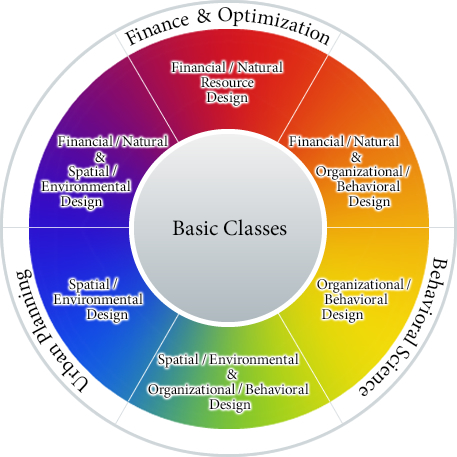Curriculum Policy about Master's Program in Policy and Planning Sciences 2019
Aiming to foster knowledge of society and logical thinking ability, embodied in the basic engineering skills that lead to "problem-solving ability," our educational program is composed of the following 3 pillars:
The Basic Subjects (completion of at least 8 units required) provides the basic skills required by Policy and Planning Sciences. The common graduate school classes are considered to belong to this class set.
The Foundation Subjects (completion of at least 12 units required), founded on skills from the Basic Subject, builds the ability to construct models from observed phenomena and analyze data. It is composed of 3 overlapping areas:
- FFinancial / Natural Resource Design: Finance & Optimization.
- Spatial / Environmental Design: Urban Planning.
- Organizational / Behavioral Design: Behavioral Science


The Master Thesis Research aims at establishing and integrating both basic and specialized abilities in the student, using the shared physical and virtual research resource we call the "TPPS Commons," available to both students and faculty through formal Research Units and other research projects, ensuring multidimensional supervision for the student.
Learning Models for Master's Program in Policy and Planning Sciences
Program titles are linked to their syllabi.
※Required subjects for students enrolled in Course in Strategic Frontiers for Regional Revitalization
Learning Model 1:
Business consultant or manager, financial plannerAfter completing 36 credits to develop ability in business evaluation or finance, become a strategic consultant giving strategic management advice; or a financial consultant formulating financial strategy and conducting financial analysis; or a manager or financial planner.
Learning Model 2:
System engineer in an IT consulting firmAfter completing 36 credits to develop analytic ability in system management, become a system engineer determining customer requirements and designing and administering a system to specification for an IT consulting firm.
Learning Model 3:
Think tank researcherAfter completing 36 credits and conducting research to develop ability related to urban planning, join a consulting business or become a think tank researcher.
Curriculum Policy about Doctoral Program in Policy and Planning Sciences
Aiming to develop problem specification skills based on problem-finding, quantitative modeling and abstraction, resulting in solution-oriented personnel capable of engineering the futures they imagine, our educational program is composed of the following 3 pillars:
Acquisition of broad-based knowledge through the graduate school's common classes and classes in other fields.
Multi-dimensional research supervision through participation in formal Research Units and other research projects.
Offering a management ability development program that starts with self-discovery of research objectives, and fosters the ability to construct research methodologies.
Besides the standard 3-year course of study, the program includes various alternative plans such as the Early Completion Course which permits finishing in 1 year, an extended 5-year course of studies, as well as the S Course (a combined first and second term course taking 3 years), the A Course (similar but taking 4 years), and the standard 5-year course.
Learning Models for Doctoral Program in Policy and Planning Sciences
| Subject Category | Subject Name | Units | Learning Model 1 | Learning Model 2 |
|---|---|---|---|---|
| Basic Subjects (completion of at least 2 units required) | (Classes from the Common Curriculum of the Graduate School) | ●(2) | ●(2) | |
| Foundation Subjects (at least 4 units) | Facilitation Training Program in Policy and Planning Sciences I | 2 | ● | ● |
| Facilitation Training Program in Policy and Planning Sciences II | 2 | ● | ||
| Facilitation Training Pre-Program in Policy and Planning Sciences III~IV | each1 | ●(1) | ||
| Internship Program in Policy and Planning Sciences | 2 | ● | ||
| Special Lecture on Policy and Planning Sciences I | 2 | ● | ||
| Special Lecture on Policy and Planning Sciences II | 2 | |||
| Special Lecture on Policy and Planning Sciences III | 2 | |||
| Special Lecture on Policy and Planning Sciences IV | 1 | ● | ||
| Special Lecture on Policy and Planning Sciences V | 1 | |||
| Special Lecture on Policy and Planning Sciences VII | 1 | |||
| Special Lecture on Policy and Planning Sciences VIII | 1 | |||
| Advanced Subjects (12 units) | Special Doctoral Seminar in Policy and Planning Sciences I ~ IV | 2×4 | ● | ● |
| Special Doctoral Research Work in Policy and Planning Sciences I ~ II | 2×2 | ● | ● | |
| Total | 20 | 20 |
Learning Model 1:
Graduate school faculty memberAfter completing 20 units from the table to acquire academic and management capabilities, join a graduate school faculty.
Learning Model 2:
Senior researcher in a think tankAfter completing 20 units from the table to acquire not merely research skills but also project facilitation ability, become a senior researcher in a think tank.


